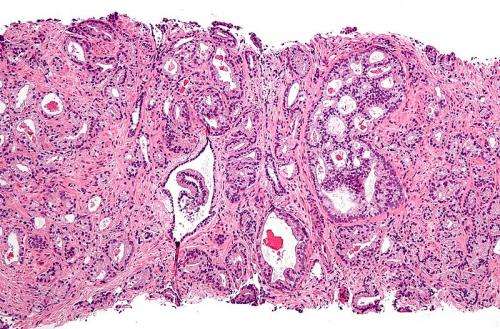Researchers find new co-regulator of the androgen receptor in prostate cancer

An international study led by University of Adelaide researchers has identified a new gene of interest linked to prostate cancer – and it's a gene with a split personality: it appears to play a major role in promoting cancer growth, but it could also prevent tumours from spreading.
The research, now published in the journal Cancer Research, provides new information about the mechanisms underlying the growth of advanced, drug-resistant prostate cancer, known as "castration-resistant prostate cancer", which is a major killer of Australian men.
Speaking in the lead up to Men's Health Week (12-18 June), lead author Dr Luke Selth, Senior Research Fellow at the University of Adelaide's Dame Roma Mitchell Cancer Research Laboratories and a member of the Freemasons Foundation Centre for Men's Health, says the results of the study are significant.
"We've identified a completely new player in prostate cancer, a gene called GRHL2. The protein encoded by this gene appears to be vital for the function of the key driver of prostate cancer growth, the androgen receptor: it not only maintains levels of the androgen receptor, but also enhances its activity," says Dr Selth.
"Interestingly, while we think this novel function connected with the androgen receptor means that GRHL2 will generally be a 'bad player' in prostate cancer, we also found evidence that the GRHL2 protein could be a 'good player' in certain contexts by inhibiting the spread of the cancer. Thus, GRHL2 could be a type of 'Jekyll and Hyde' factor in terms of influencing the growth and progression of this disease," he says.
"However, by the time prostate cancer has already spread around the body and become resistant to current therapies, our research suggests that GRHL2 would probably act as a driver of disease. This idea is supported by our observation that the GRHL2 gene is frequently 'amplified' in lethal, drug-resistant tumours, meaning that these tumours have the capacity to make a lot more GRHL2 protein."
Targeting the androgen receptor is the mainstay treatment for advanced prostate cancer that has spread beyond the prostate. Therefore, there is always significant interest when a new regulator of the androgen receptor is discovered. Indeed, this study was highlighted by the leading review journal Nature Reviews Urology, because of its fundamental findings.
"We desperately need better therapies for this common killer of men. Our study provides important new insights into the biology of prostate cancer, which we aim to translate to new treatment strategies in the future," Dr Selth says.
More information: Clemens Thoma. Prostate cancer: New AR co-regulator with dichotomous functions, Nature Reviews Urology (2017). DOI: 10.1038/nrurol.2017.78
Steve Paltoglou et al. Novel androgen receptor co-regulator GRHL2 exerts both oncogenic and anti-metastatic functions in prostate cancer, Cancer Research (2017). DOI: 10.1158/0008-5472.CAN-16-1616















